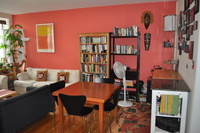Originally posted by
There’s a recipe. It’s a recipe for maximally useful-for-engendering-virtual-community-LJ/DW-style. I’m not sure I have it exactly down yet — this is the alpha version — but I’m pretty sure that, contrary to a lot of LJ/DW users think, it goes something like this:
Recommended Minimum Weekly Posts by Type:
0.5 diary entry
3 pointers
0.5 bleg
0.25 op ed
Definitions follow in the original.
I’m getting up at 7am now, so maybe I can do this with my fudge-time.
I’m back. I’m sorting through pictures to produce tighter “best-of” posts, but time is tight with classes now a couple weeks in. I just turned 30 yesterday. We threw a fun “surreal” themed party– with upside-down flowers and all drinkable foods.
I have a poem to post, some recent software work, and a rant against people who say the problem with the [world, country, government] is some other group of people. But now I wanted to respond to something I just read.
I’m reading an article by Kenneth Arrow (big econ guy; “Are We Consuming Too Much?”, 2004), which claims to be a meeting of minds between economists and ecologist, but is pretty solidly economist-think, just about the nature of sustainability. The claim is, sustainability is endlessly rising consumption.
Not only is that vision intrinsically grotesque, there are a couple points that I think turn it on its head:
- Poverty is not about insufficient average consumption. An Irish friend (in my program) explained to me at the party that during the Great Irish Famine, Ireland was producing enough food for everyone. But moneyed interests were exporting it all to England. Today, worldwide, poverty is a result of inequality and a lack of support systems.
- As part of that, as a world, we already consume too much. Not only is our level of consumption too much for the environment, it’s also too much for our own well-being. Thailand has a per-capita income of around $5000 ($13/day)– an income at which you have food, shelter, education and work (they have 1% unemployment), and people seem wonderfully happy. World per-capita income is now at $7000… and yet about 3.5 billion people (half of the world) lives on less than $2 per day.
Forget about increasing the world economy. Let’s shrink it– we can worry about living on more than $13/day later, after we get a better grasp of the whole climate change thing.
Plans for Southeast Asia
We leave for Southeast Asia on Wednesday, after a life of wanting to go! We have five weeks, before my school starts back up and Johanna’s vacation days run out, but it already feels like a brisk visit.
Why is it so difficult to limit oneself to one place? It looks like travel will be more expensive than we imagined (the cheapest hotels are still ~$18 / night in Bangkok!), and language more difficult (we gave up learning the alphabet after the fifth ‘kh’). And yet, after feeling sure we would be happy spending our time mostly in northern Thailand with a 10-day taste of Burma, we discovered Lonely Planet’s 1-2 month, seven country route, and everything is back on the table.
Below is our best idea itinerary for now. We’ll each be working ~4 hours a day, so we don’t want to move more than every other day, which leaves us about 15 locations to explore.
Wednesday, 7/27: Leaving from Newark at 11am
Thursday, 7/28: 4 hours in Tokyo, then arriving in Bangkok at 11pm
Saturday, 7/30: Fly to Rangoon, Burma (300 ft gold stupa)
Monday, 8/1: Pagan (ruins)
Wednesday, 8/3: Inle Lake (island monasteries)
Friday, 8/5: Mandalay and surrounding old cities
Sunday, 8/7: Fly to Bangkok
Monday, 8/8: Ayuthaya or Lapburi (for ancience and art)
Wednesday, 8/10: Khao Yai National Park
Thursday, 8/11: Phimai (Khmer temple)
Saturday, 8/13: Nong Khai, Thailand / Vientiane, Laos
Monday, 8/15: Luang Prabang, Laos
Wednesday, 8/17: Boat on the Mekong River, or Luang Nam Tha or Muang Sing
Friday, 8/19: Chang Mai, Thailand (weekend market)
Sunday, 8/21: Pai or Mae Hong Son (culture and diversity)
Tuesday, 8/23: Sokhothai (ruins) or Phitsanulok (Buddha and noodles)
Thursday, 8/25: Bangkok
Saturday, 8/26: Fly to Phuket, then bus to Khao Sok National Park
Sunday, 8/27: Khao Lak (beach)
Monday, 8/29: Fly to Bangkok
Tuesday, 8/30: Leaving Bangkok at 11pm
Wednesday, 8/31: 8 hours in Tokyo, then arriving in Newark 5 minutes before we leave
With luck, we’ll be visiting a mother of a friend of mine in Rangoon. We’re bringing a bunch of books with us to hand out as gifts in Burma (and we’ll be refilling that space with purchases from our travels).
Vision Quest
A vision quest is calling me.
My relationship with Flame is wonderful– forever inspiring, challenging, exciting. I wouldn’t marry for my own sake, but recent discussions have made me realize that it’s not for people like me that marriage exists, and commitment for life isn’t for eternity anyway, right?
Whenever I imagine proposing to Flame, I feel this father figure welling up within me, like a personification of a van Gennep rite of passage. The figure is my father, though not quite as he looks in my one picture of him. He died when I was 10 and he was 34, but he is a part of me in so many ways.
People are said to become more like their parents on the other side of this particular rite, and I wonder what that will mean for me. I’m proud to consider myself an adult already, and have for years, but rites of passage are powerful. Who is this man inside me? I remember very little of him, and I only know fragments from what others have told me. When he appears, what will be come of me? I need to know who he was at my age.
My quest is to find my father, by talking to those who knew him. The door ahead scares me a little, but I will approach it with caution.
Sublet our NYC Apartment for August!
Please forward this description and photos to any friends you know who are looking for a wonderful apartment for August!
Johanna and I are leaving our beautiful, one-bedroom Columbia area apartment between July 27 and August 31. We want a you to enjoy our great NYC location for a student-subsided rent!
Setting:
Our apartment is on the 3rd floor of an elevator-equipped building at Amsterdam and 122nd St. It’s two blocks from Columbia University, and a short walk to the 1 train at 116th and the A, B, C, and D trains at 125th. Several buses stop on Amsterdam and Broadway. It’s one block from Morningside park, two blocks from Riverside park, and 10 minutes from Central Park.
Apartment:
The apartment comes fully furnished including bed with extra linens, and comfortable and decorated living and dining areas. Appliances in the kitchen include full size gas stove and oven, microwave, toaster-oven, lots of pots and pans and place setting for many mouths. There are windows in every room.
Additional Perks:
- Free wi-fi.
- Free New York Times daily ($17/wk value), and a few other magazines
- Half of a CSA share which you can pick up from 114th and Broadway ($20/wk value)
- Air conditioning in the bedroom, but please see below about utilities costs
- Washer and dryer in the basement
Limitations:
- We do not own a TV.
- Our stuff will be put away in an orderly fashion into every nook and cranny. We will mostly empty the front closet, half of the dresser, and a large wardrobe for you to use.
- We have a table full of plants. Please water them weekly.
- No pets allowed.
We are asking the price of our rent and utilities for one month: $1500 total. We will take a $200 deposit. If the utilities for August are more than $100 (normal bills are $50 – $70), it will come out of that deposit.
Please contact us if you have any questions!
– James and Johanna (301-802-0529)
In Boston for a Conference
Quincy is hosting the Eighth International Conference of Complex Systems, which is right up what could be my alley. And my program graciously agreed to pay for me to go, including two Chinatown bus tickets and a cheap room through airbnb. So I’ll be around Boston tomorrow through Wednesday. Though, between the conference and my half-time job, time will be tight!
[edit: Or maybe no time. I left at 7:30 and didn’t get back until around 10 today. By the way, anyone know why my comment #’s have disappeared?]
Posting for Posting Sake
I need to just write more, and not worry about having so much to say! I feel guilty about just posting project updates here, rather than personal ones.
Flame and I are well on our way to a full inversion of gender roles. I kiss her off every morning, and putz around the house until she comes back in the evening. We get the New York Times, and last week Flame immediately asked for the Business section (she has to stay on top of it for Greenpeace), and I grabbed Home (which had a leading article on inefficient bulbs).
That hardest part of grad school, I’m finding, is knowing when to try to make something publishable. No one advises me, so I work on projects and write things up and try in vain to get anyone to give me feedback.
The First Year
The first year of my PhD is done, and it was everything I could have hoped for! The economics classes were as challenging as any at MIT, and combined with research, this last semester ranks as one of my most intense. The School of International and Public Affairs is practically gift-wrapped in fliers about interesting looking talks and actions of which I went to very few, but I did have the opportunity to give talks of my own, facilitate some internal foment, and help organize our fabulously successful sustainable development conference. For all the opportunities lost– missed activities, under-studied classes, and under-researched papers– I think there were more hard-won satisfactions and useful milestones set.
My friends here are as kind as they are sharp. My colleagues are passionate about research topics ranging from New York air quality to Nigerian agriculture, and their backgrounds are even more widespread. I’m starting up a “Tuesday Evening Experiments” meeting for the summer so we can get together and poke at random data, try out funky models, and generally collaborate together on some cool projects.
The usefulness of the economics I’ve learned remains in serious doubt. Some of the ideas are powerful, but it’s not clear that they are any more than a biased shorthand for the obvious. Hours after my final in microeconomics, I was talking outside in the beautiful sun, and a friend asked why everyone else was indoors. It was a Nash equilibrium, I quipped. But even if it looked like one, it couldn’t be– like so many economic models, the assumptions of game theory are so divorced from reality that all they can do is give answers to rhetorical questions.
But now, with some summer money for research and a part time job for the rest, I think I finally have a chance to delve into my own navel and see where it goes!
Thought Experiments
Suppose that when you die, you are told that you have and will continue to be reincarnated forever. In fact, there are unlimited worlds that you can live your next life on, and a full catalog awaits from which you can choose. Many worlds are closer to God (or the One, the divine essence) than this one. The catch is that if you decide to open the catalog, you can never find this world again. For example, you could live ten lives in this world, and then ten lives in another, and so on forever.
If you knew there was a lifetime more of beauty to find and good to do here, would you ever choose to change worlds? When?
Additionally, suppose that you can choose to be reincarnated with the same soul you have now, or choose from an infinite catalog of other souls. But if you give up your current soul, you can never come back to it. You could choose to be the Dalai Lama in your next life, but then you can never be yourself again.
If you knew there was a lifetime more of growth for you and wisdom in need (on whatever planet you live on) with this soul, would you ever try a different one?
Now, suppose that constantly in life you are being offered these choices. One way it’s framed may seem fairly removed: you are asked, in a million ways, whether you want to engage with people directly, or to engage with tools of various sorts. The tools (from computers to paradigms to limbs and eyes to the mind) are offered as a way to help you grow and do more. The catch is that the divine essence is to be found in the Other, in people, and every tool brings you further from It.
You can choose to give up as much technology as you want to be closer to God and others, but whatever you give up you can never get back in the same way. What would you give up, and when?
My Research
I don’t think I’ve written about my research projects, and since they always seem to be multiplying, I wanted to present them frozen here in time:
Open Model for Climate Behaviors: I applied for an EPA fellowship based on this. The idea is to construct a dynamic model of sufficient complexity that it’s possible to identify tipping points in the forces that affect American society’s climate behaviors. In other words, to build a system to help find small policy changes, which will grow to really change how people act. (Project Proposal)
Glaciers and Flooding in Himalayan River Basins: The Himalayan glaciers are melting, and their rivers are flooding– might these be related? No one seems to have checked. But I have a bunch of remote sensing analysis and good modeling that might be close to an answer. (Working Paper)
System Regression Estimators: My colleagues spend all their time running regressions, agonizing to find “exogenous” variables– variables which affect things but aren’t themselves affected. I don’t think such things exist, and I have some math that might let us give up the battle and estimate the relationships in whole systems, where everything affects everything else.
Self-Organized Criticality in Ecology: Self-organization is everywhere in human and natural systems, yet we’re only beginning to understand its implications. In particular, I think we’re very close to being able to describe ecological systems in the terms of self-organization, and I intend to give it a try.
Beyond that is the long tail of projects. My Alternative Economics group last semester was enlightening, and remains a big interest for me. I thought my paper on the connection between the Creaturely Life and access to reality was pretty successful. A couple weeks ago, I identified the size of hidden “poverty-or-wealth” sectors missing from standard (two-sector) economic models. While not research, I recently open-sourced a bunch of artificial intelligence code for natural language processing, built Flame a Droid app for Valentine’s day, and taught a class on unix and shell scripting. Hopefully this summer I’ll have a chance to build some of three online projects I think would be powerful: a site that acts as a personal adviser for counterbalancing the unintended consequences of your purchases, a site to help volunteers self-organize on ambiguous projects, and a site to hold politicians accountable for their campaign promises.
There’s a lot more I could say about all of these, but that’s a start.







